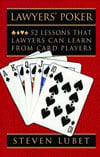

Lawyer's Poker: 52 Lessons That Lawyers Can Learn From Card Players

Steven Lubet
Reviewed by
- Avoid
- Browse
- Buy
- Love
- Never Play Without It
Although being a proficient poker player certainly isn't a prerequisite for success in the courtroom, that hasn't stopped lawyer and avid card player Steven Lubet from drawing parallels between what happens in the court room and on the felt. The author, who is best known for his previous work Murder in Tombstone: The Forgotten Case of Wyatt Earp, does make many interesting cases. Readers will discover the common threads between the two disciplines, like in-depth analysis and strategic thinking. While this title will probably appeal more to fans of legal dramas than poker players, just about anyone can relate to the analogies in 52 Lessons That Lawyers Can Learn From Card Players.
When comparing the legal profession, gambling is generally not the first association that comes to mind. However, Steven Lubet's ground-breaking work manages to weave together the two seemingly disparate worlds.
Steven Lubet is a lecturer at Northwestern University with expertise in trials and trial strategy. Famed for his previous book, Murder in Tombstone: The Forgotten Case of Wyatt Earp, it's no surprise that Lubet's Lawyer's Poker is a captivating read. This book is a showcase of the author's expertise in his own profession and in poker.
Lubet opens with the tale of a young lawyer in Texas being interviewed for admission to practice. In his interview, he was asked the question 'do you play poker?' Without abruptly going into a profound in-depth analysis of the poker game, Lubet uses compelling examples of poker players' strategic thinking, which he relates to anecdotes from the courtroom. By doing this, Lubet continues to enlighten readers how lawyers' thinking stands to benefit.
Lawyer's Poker ingeniously follows a similar layout to a pack of cards. The book is divided into four 'suits' - Diamonds: 'Maximising your winnings', Clubs: 'Controlling the Opposition', Spades: 'Digging for Information' and Hearts: 'Ethics and Character.' Within each 'suit', there are thirteen lessons, which cover a range of themes from bluffing to self-control. Each of the 'suits' offers a valuable insight into the importance of strategy. For example, one highlighted aspect of 'Controlling the Opposition' that he describes is preventing them folding by 'slow playing', which he then likens to a lawyer putting his witness falsely at ease, just before 'going in for the kill'.
Although the book is focused primarily on offering lessons to lawyers and those aspiring to the legal profession, it is not intended to be a definitive guide of the strategies that should be used in the courtroom. Rather, it suggests that poker be utilised as a creative tool, through which valuable lessons can be learnt. The benefits of this book may also be reaped by poker players, whether neophytes or veterans. Lawyer's Poker is a valuable aid to develop poker skills.
The creative and entertaining approach taken by the author makes the book fully comprehensible to those who have neither sat at a poker table nor entered a courtroom. It is on this merit that we highly recommend this book. Although it does concentrate on trial strategy, it is not overwhelming to the average reader. In addition to this, a key feature of this book is that it introduces everything at entry level, steadily building up your knowledge and understanding as it progresses.
